Edition: 12 to 23 August 2024
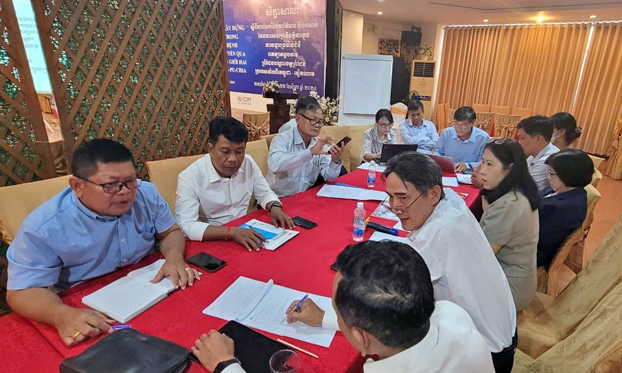 © FAO/Pham Thi Bich Ngoc | VIET NAM AND CAMBODIA One Health cross border meeting
The FAO ECTAD in Viet Nam and Cambodia, along with the International Organization for Migration (IOM) and Viet Nam’s General Department of Preventive Medicine under the Ministry of Health (GDPM-MOH), organized a cross-border One Health meeting between Viet Nam and Cambodia in An Giang Province from 21 to 22 August. Representatives from Viet Nam's Ministry of Health (MOH) and Ministry of Agriculture and Rural Development (MARD) and Cambodia's Ministry of Health (MOH) and Ministry of Agriculture, Forestry and Fisheries (MAFF), as well as health and animal health authorities from eight border provinces, discussed disease situations, reviewed the Border Health Quarantine Agreement, and emphasized the importance of a multi-sectoral and transnational approach to pandemic preparedness. This meeting served as a valuable platform for Viet Nam and Cambodia to enhance their cooperation in public health security. |
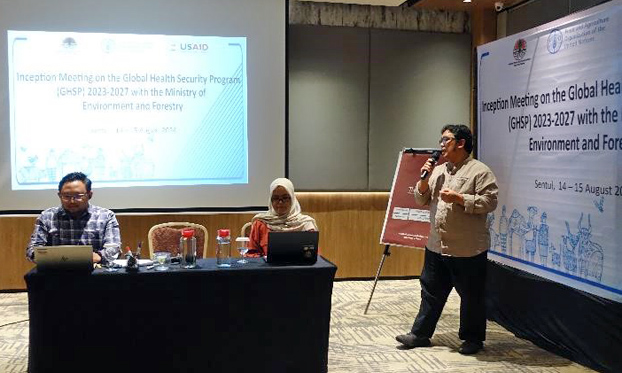 © fao/Saskia Soedarjo | INDONESIA GHSP consultation meeting with the Ministry of Environment and Forestry On 14 and 15 August, FAO held a consultation meeting in Bogor with the Ministry of Environment and Forestry (MoEF) to discuss the Global Health Security Programme (GHSP) for 2023–2027, supported by USAID. The meeting followed the program's recent registration and approval by MoEF and was opened by the Director of Biodiversity Conservation and Genetic Resources at MoEF. FAO team presented their 2024 workplan and the GHSP workplan for 2025, which will be implemented in collaboration with MoEF. The GHSP, in partnership with MoEF, focuses on four key outcomes: improving detection and response through early warning systems and surveillance, strengthening government capacity for evidence-based policies, increasing the capacity of multidisciplinary wildlife health workforces, and enhancing the project's visibility and accountability. |
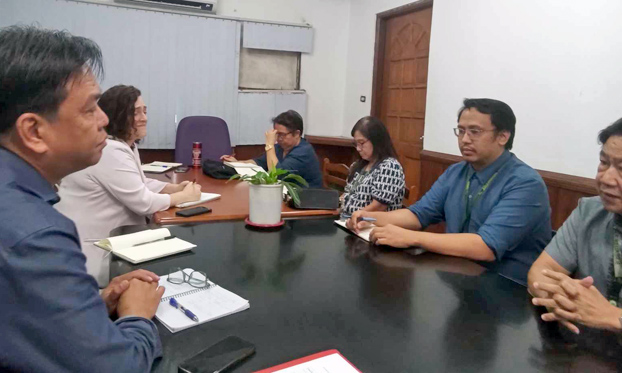 © FAO/Michelle Balbin | THE PHILIPPINES Consultation meeting on the Global Health Security partnership and activities During the first week of August, FAO participated in the consultation meeting between the Bureau of Animal Industry, representative of the USAID Global Health Security in Washington - Bureau for Global Health's Office of Infectious Disease, USAID Health Mission in the Philippines. The meeting focused on the current GHS partnership and activities in the animal health sector. The activity is part of the USAID GHS’ backstopping mission to the Philippines. |
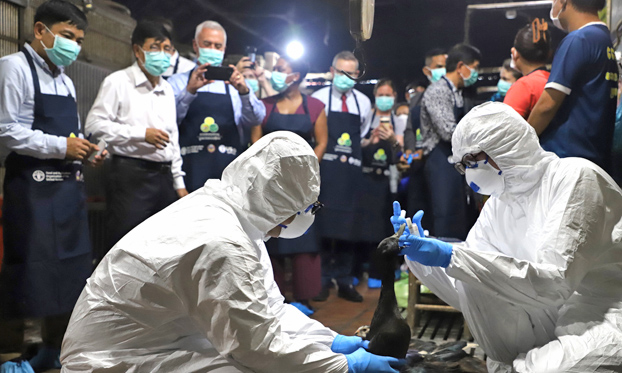 © FAO/Siheng Ngon | CAMBODIA Congressional delegation's visit to the live bird market in Orussey The Congressional Delegation of the United States of America visited Orussey Market to observe bird swab collection, air sampling, and environmental sampling as part of the Avian influenza virus (AIV) surveillance program jointly carried out by FAO, the Government of Cambodia, General Directorate of Animal Health and Production (GDAHP) and Institut Pasteur du Cambodge (IPC). The visit highlighted how the partnership between the USA and Cambodia is advancing global health security by bolstering Cambodia's ability to prevent, detect, monitor and respond to emerging infectious disease threats like H5N1. The surveillance program is funded by the US Agency for International Development (USAID). |
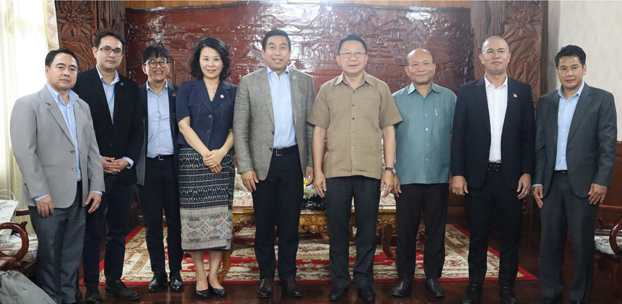 © fao/Bounmee Maokhamphiou | LAO PEOPLE’S DEMOCRATIC REPUBLIC FAO bridges key strategic partners for greater and better impacts Director of the Animal Production and Health Division (NSA) Dr Thanawat Tiensin, made a courtesy visit to Lao People’s Democratic Republic (Lao PDR) to purposely tighten connection among key partners to ensure greater and better impacts on the development work for the people of Lao People's Democratic Republic. Dr Thanawat was ambitious to learn the priorities of the Ministry of Agriculture and Forestry and Government of Lao PDR in general, to better serve the interests of Lao people on agricultural development. He expressed that “we, as FAO in Lao PDR, want to make sure that your priorities are our priorities”. |
.jpg?sfvrsn=6cb4ce97_1) © fao/Saskia Soedarjo | INDONESIA Planning to establish the field training program for wildlife, environment, biodiversity, and ecosystems (FTP-WEBE) FAO, in collaboration with the Indonesian Ministry of Environment and Forestry, held a planning meeting to establish the Field Training Program for Wildlife, Environment, Biodiversity, and Ecosystems (FTP-WEBE) in Indonesia from 19 to 20 August. This initiative, supported by FAO RAP and USAID, marks the first replication of FTP-WEBE globally. Representatives from FAO RAP led the meeting, guiding participants in designing a program tailored to the specific needs of Indonesia. The participants produced several key outcomes: a draft curriculum and list of modules for FTP-WEBE in Indonesia, potential criteria or lists for trainers, mentors, and participants, as well as a timeline of activities leading up to the first training session. |
Learn more about our work on partnerships here. | |
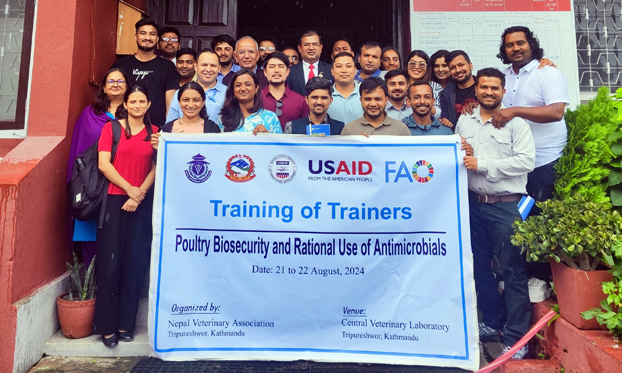 © fao/SuJAN SHRESTHA | NEPAL Training of trainers on biosecurity and rational use of antimicrobials FAO, through the USAID funded GHSP project supported Department of Livestock Services and Nepal Veterinary Association to conduct a two-day “Training of Trainers on Biosecurity and Rational Use of Antimicrobials” during 21–22 August in Kathmandu. The objective of this training was to prepare a cohort of trainers who will be mobilized to train 350 small and medium holders’ pig and poultry farmers of covering all seven provinces of Nepal. The training was conducted in collaboration with the Nepal Veterinary Association (NVA).
|
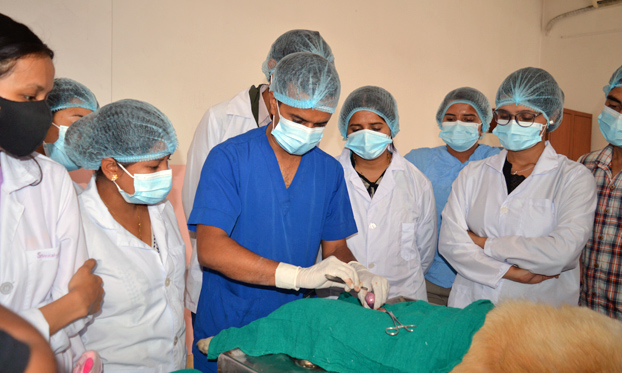 © fao/Pallavi Adhikari | NEPAL Animal birth control surgery training to veterinarians for rabies elimination FAO, through the USAID funded Global Health Security Project supported Department of Livestock Services (DLS) to conduct a three-day “Hands-on Animal Birth Control (ABC) Surgery Training” for public and private veterinarians during 22-24 August in Kathmandu. The objective of this training was to build the capacity of veterinarians for dog population management to contribute towards the global strategy of “zero by 30” target of Rabies elimination. Eighteen veterinarians from public, private and academic sectors were provided hands-on skills to conduct animal birth control surgeries. The training program was conducted in collaboration with Central Referral Veterinary Hospital (CRVH) and Veterinary Practitioners’ Association Nepal (VPAN).
|
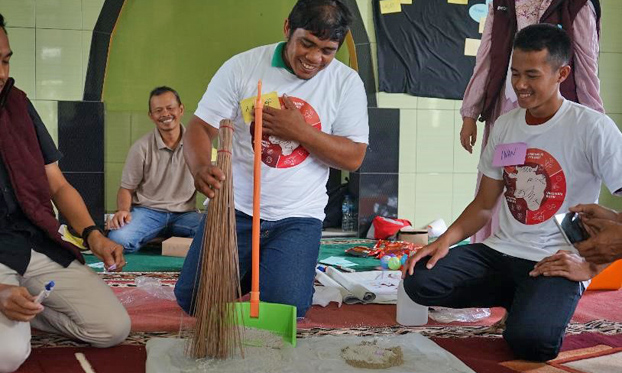 © fao/Alia Dwirahmani | INDONESIA Subnational training on FMD and LSD control and prevention With Australian Government support, FAO, in partnership with the Directorate General of Livestock and Animal Health at the Ministry of Agriculture (DGLAHS-MoA) and the Jalin Foundation, conducted a five-day subnational training in Sukabumi Regency from 19–23 August 2024. The training focused on foot-and-mouth disease (FMD) and lumpy skin disease (LSD), emphasizing detection, response, biosecurity, and risk communication. Led by master trainers and supervised by DGLAHS-MoA facilitators, 26 animal health field officers from various sectors received training. The training demonstrated significant improvements, with a 34 percent increase in detection and response, a 48 percent increase in biosecurity, and a remarkable 113 percent increase in risk communication. Overall, the training boosted competency by an average of 54 percent.
|
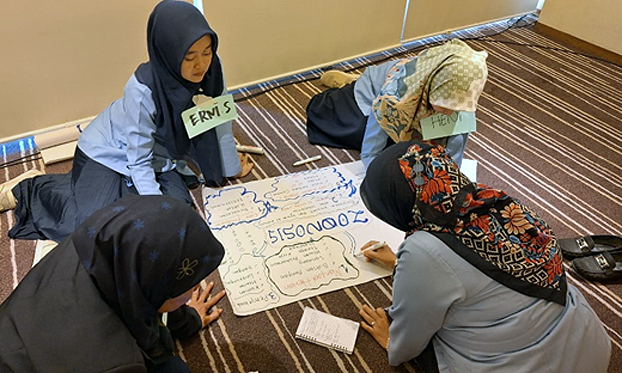 © fao/Ratmoko Saputro | INDONESIA Teachers' training on integrating Zoonoses awareness in the Yogyakarta school curriculum From 13 to 16 August, FAO, in collaboration with the Ministry of Agriculture (DGLAHS-MoA), Balai Besar Guru Penggerak (BBGP) Yogyakarta, and with support from USAID, conducted zoonoses awareness training for teachers and headmasters from 20 selected elementary schools and 20 junior high schools in Sleman and Gunungkidul districts, Yogyakarta. The training aimed to equip educators with an understanding of zoonoses awareness materials and enable them to incorporate this awareness into their classroom subjects and school curricula.
|
Learn more about our work on capacity development here.
| |
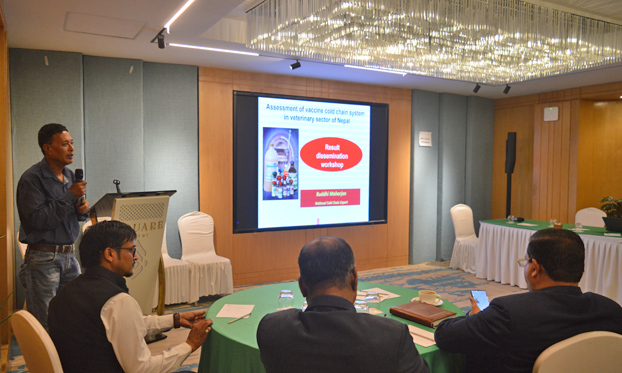 © fao/Pallavi Adhikari | NEPAL Final sharing workshop on the cold chain assessment FAO, through USAID funded Global Health Security Program (GHSP) and Pandemic Fund Support Program for Economic and Enterprise Development (SPEED) Projects, supported in conducting the country level cold chain assessment of veterinary sector. A final report sharing workshop was held in Lalitpur on 15 August to share the major findings, gaps and recommendations from the assessment. The assessment was conducted through onsite visits, seven provincial consultation workshops and a series of meetings at the federal level and onsite visits in selected local levels and districts. The workshop was conducted in collaboration with the Department of Livestock Services (DLS).
|
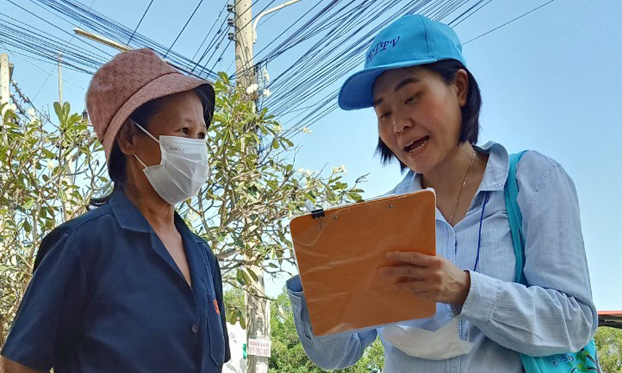 © FAO/RFETPV | ASIA AND THE PACIFIC Enhancing technical support and mentorship for regional FETPV trainees From August 19 to 23, the Regional Field Epidemiology Training Program for Veterinarians (RFETPV) conducted a series of online mentoring meetings for its 2024 cohort. During the meetings, all 13 trainees from Thailand, Nepal, the Philippines, Cambodia and Lao People’s Democratic Republic individually reviewed their progress and addressed challenges with their mentors. RFETPV makes substantial efforts in mentorship to enhance trainees’ field practices. With support from DTRA and USAID, a robust and diverse mentor team has been assembled, including in-country experts, experienced epidemiologists from the Department of Livestock Development (DLD) Thailand, the FAO ECTAD RAP and its country teams, USAID, and various Thai universities.
|
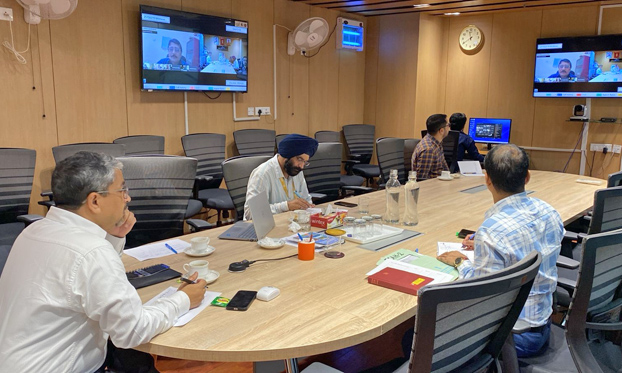 © fao/Vikram Vashisht | INDIA Collaborating to strengthen epidemiology capacity of field veterinarians FAO, in collaboration with the Department of Animal Husbandry and Dairying (DAHD), has developed the “In-Service Applied Veterinary Epidemiology Training” (ISAVET) program to enhance the essential skills of field veterinarians. This initiative, supported by USAID, focuses on epidemiology capacity development by providing training on veterinary epidemiology, disease surveillance and outbreak investigation. On 22 August 2024, a virtual meeting was convened with representatives from DAHD, FAO, and the State Animal Directors to review the course module, duration, and learning objectives of the ISAVET program. The primary objective of this meeting was to gather critical feedback from state stakeholders, ensuring that the program is tailored to address the unique challenges and requirements of each state.
|
Learn more about our work on epidemiology here.
| |
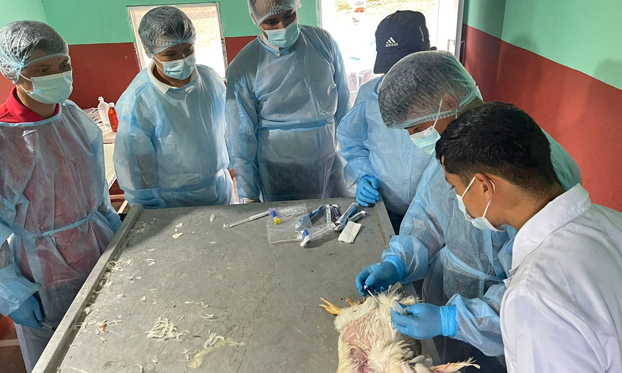 © FAO/Sharmila Chapagain | NEPAL Sample collection, dispatch and epidemiological reporting training
FAO, through the USAID funded GHSP project, conducted a 2–day training on “Sample collection, dispatch and epidemiological reporting” in Veterinary Hospital and Livestock Services Expert Center, Nuwakot. The objective of this training was to equip animal health professionals working at local levels of Nuwakot and Rauwa districts of Bagamati province with hands-on skills of appropriate sample collection, packaging and dispatch of samples for prompt disease diagnosis. The training, conducted in collaboration with the Department of Livestock Services and Central Veterinary Laboratory ran from 21 to 22 August. |
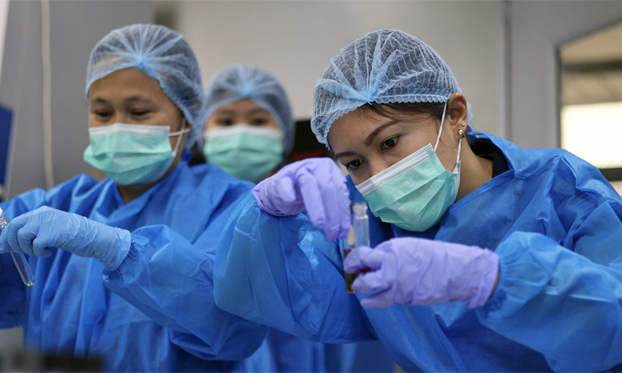 © BAI-VLD/Mervyn Agad | THE PHILIPPINES Salmonella isolation and identification training for diagnostic laboratories
FAO, in partnership with the Bureau of Animal Industry (BAI) Animal Disease and Diagnosis Reference Laboratory (ADDRL) conducted the Salmonella Isolation and Identification Training for Regional Animal Disease Diagnostic Laboratories (RADDL) and State University and Colleges (SUC) during 5 to 9 August 2024. The training aimed to harmonize laboratory procedures to support of the surveillance capacity and generation of quality data of the laboratories involved in the National Poultry Salmonella Prevention and Control Program of the Philippines. The activity was co-funded by USAID, UKAid and the Fleming Fund. |
Learn more about our work on capacity development of laboratory here.
| |
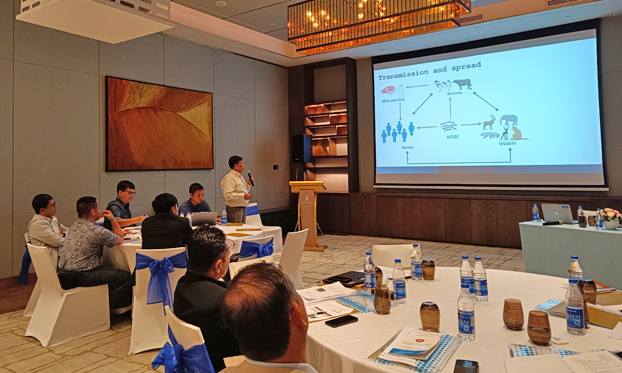 © FAO/Ohn Kyaw | MYANMAR Workshop on good dairy farming practice and milk standards
FAO organized a workshop on preparedness to produce safe and hygienic dairy products based on good dairy farming practice and milk standards on 21 August in Yangon with support from the USAID funded GHSP project. The workshop aimed to promote knowledge exchange on good dairy practices among stakeholders, based on animal husbandry, raw milk, and dairy product standards, to enhance food safety and hygiene in dairy processing and reduce foodborne diseases. Participants learned about factors affecting milk quality, ASEAN accreditation criteria, current quality control methods in processing plants and zoonotic tuberculosis’ public health impact. |
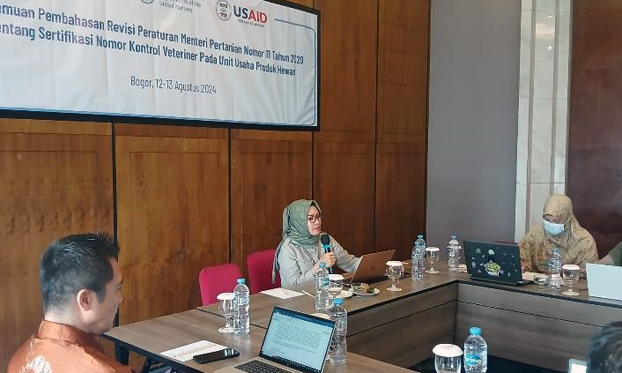 © FAO/Erianto Nugroho | INDONESIA Revising Ministry’s regulation on NKV certification
FAO and the Directorate General of Livestock and Animal Health Services (DGLAHS), with USAID support, convened a meeting on 12 and 13 August, in Bogor to review the norms, standards, procedures, and criteria (NSPK) for revising Minister of Agriculture Regulation 11/2020 on veterinary control number (Nomor Kontrol Veteriner/NKV) certification for animal product business units. The focus was on NKV registration requirements for farms and poultry slaughterhouses, specifically the NKV checklist assessment aspects of good veterinary practices, biosecurity, animal welfare, facilities and equipment, product handling, sanitation, and hygiene. The meeting concluded with an agreement to simplify the NKV registration system to encourage greater participation from business actors. |
Learn more about our work on risk reduction along the value chain here.
| |
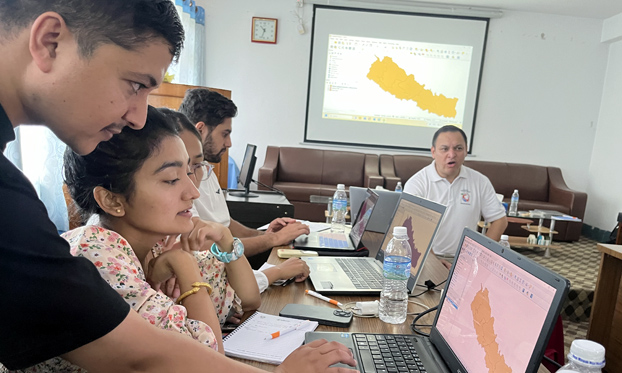 © FAO/Pallavi Adhikari | NEPAL Spatial data visualization using Q-GIS software FAO, through USAID funded Global Health Security Program (GHSP), conducted a one-day training on “Hands-on Spatial Data Visualization using Q-GIS software” to veterinary interns on 17 August in Kathmandu. The objective of this training was to equip youths from different universities of Nepal with necessary skills in spatial data visualization. Twenty students from three universities were provided hands-on skills to visualize the point, categorical and quantitative data. The training was conducted in collaboration with the Department of Livestock Services (DLS).
|
-in-madhesh-pradesh.jpg?sfvrsn=4c382675_1) © FAO/Nabin Paudel | NEPAL Training on National Animal Health Information System (NAHIS) in Madhesh Pradesh FAO, through the Pandemic Fund project conducted three slots of one-day “Orientation Training on National Animal Health Information System (NAHIS) for Epidemiological Reporting” for animal health officials working at local levels and district hospitals of all eight districts of Madhesh Province. The objectives of these trainings were to train the field level animal health officials to use the web-based NAHIS software for epidemiological reporting. The trainings, conducted in Janakpur in collaboration with the Department of Livestock Services and relevant provincial Ministry and Directorate, during 22–24 August involved 145 animal health officials.
|
| Learn more about our work on surveillance here. | |
-rabies-elimination-activities.jpg?sfvrsn=60b39634_1) © FAO/Roxanne Bunayog | THE PHILIPPINES Supporting the One-Time Big-Time (OTBT) rabies elimination activities FAO, with support from the USAID GHS project, participated in door-to-door vaccination, spay, neuter, and castration activities in Marinduque, aimed at controlling the dog population, promoting responsible pet ownership, and addressing the rabies cases in the island. The collaborative effort among MIMAROPA local government units, regional offices, national agencies, private partners, and non-profit organizations successfully vaccinated over 9,000 dogs and over 2,000 cats and provided spay and neuter services to over 500 pets from 5 to 9 August. Aligned with the Zero by 30 global strategic plan, this initiative is part of a broader campaign to enhance public and animal health and ensure safer communities by preventing the spread of dog-mediated rabies and managing stray animal populations effectively.
|
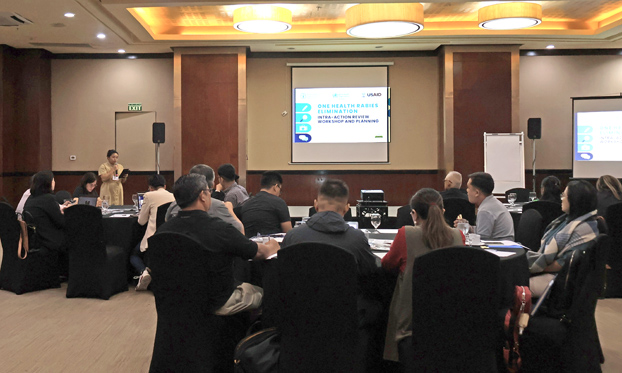 © FAO/Michael del Remedios | THE PHILIPPINES One Health rabies intra-action review and planning FAO, in collaboration with the WHO and USAID Global Health Technical Advisory Mission Support (GH-TAMS), with technical support from the Field Epidemiology Training Program Alumni Foundation, Inc (FETPAFI), conducted the One Health Rabies intra-action review and planning session from 13 to 15 August. The workshop reviewed the implemented activities so as to improve and replicate them in other regions. The activity, supported by the USAID GHS project, was attended by the local tripartite (Department of Health and Department of Agriculture), government units, as well as other development partners.
|
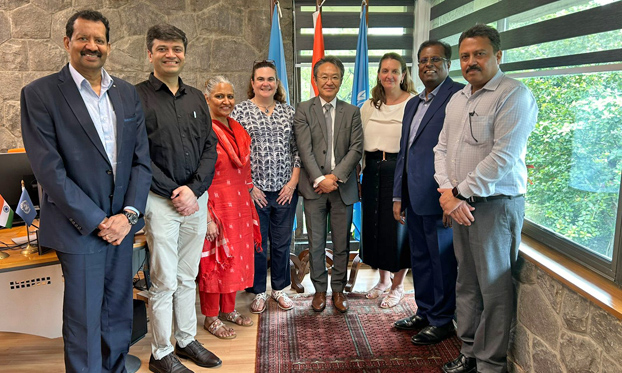 © FAO/Pooja Choudhary | INDIA Strengthening the animal health sector with the One Health approach On 12 August 2024, the FAO Representative in India, Mr Takayuki Hagiwara, along with FAO team, met with USAID to advance efforts aimed at strengthening the animal health sector in India. The discussions centered on enhancing collaborative efforts and exploring new opportunities for sustainable development using the One Health approach. The meeting also highlighted the shared commitment of FAO and USAID in advancing integrated health solutions. It emphasized the importance of a unified approach to effectively tackle global health challenges and support sustainable, long-term health outcomes for humans, animals and the environment.
|
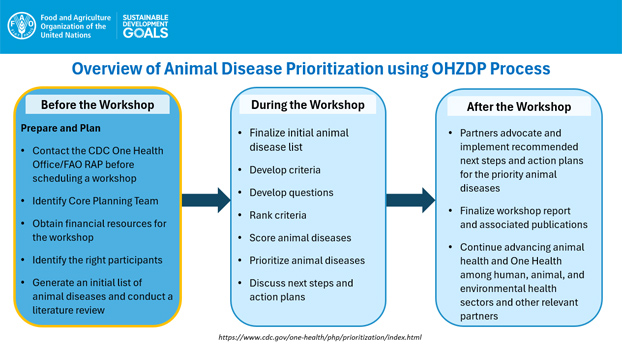 © FAO/Yin Myo Aye | ASIA AND THE PACIFIC AND CAMBODIA First core planning meeting on animal disease prioritization FAO organized the first core planning team meeting on 14 August 2024, and ECTAD in FAO RAP facilitated the preparation for the animal disease prioritization to be held from 18-20 September 2024. The One Health Zoonotic Disease Prioritization (OHZDP) is a process developed by the United States Centers for Disease Control and Prevention (US CDC). OHZDP process will be adapted to prioritize animal diseases in Cambodia. The process was utilized by ASEAN Veterinary Epidemiology Group (AVEG) to prioritize transboundary animal diseases in 2019 and the upcoming animal disease prioritization will be in India from 28 to 30 August 2024.
|
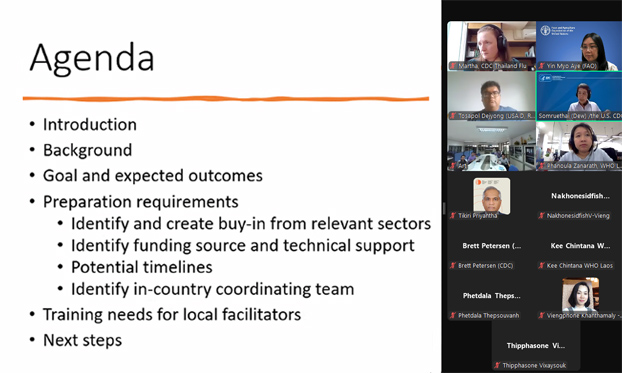 © FAO/Yin Myo Aye | ASIA AND THE PACIFIC AND LAO PDR Discussion for OHZDP preparation Partner organizations met together to discuss and plan for OHZDP in Lao PDR on 16 August 2024, including country and regional offices of FAO, US CDC and WHO. WOAH and USAID regional offices also attended the meeting. This was a follow up event after the regional OHZDP training held last year where FAO contributed as a trainer. 10 representatives from animal, human and environmental health in Lao PDR actively participated in the regional training. OHZDP uses a multisectoral, One Health approach to prioritize zoonotic diseases of greatest concern, develop next steps and action plans to address the priority zoonotic diseases in collaboration with One Health partners. The OHZDP workshop will be in Sri Lanka was held from 21 to 23 August 2024.
|
-meeting.jpg?sfvrsn=f75c153c_1) © FAO/Yin Myo Aye | ASIA AND THE PACIFIC Participating in the Regional Quadripartite Coordination Group (QCG) meeting During the Regional QCG meeting on 20 August 2024, the regional offices from the Quadripartite organizations, including FAO, provided updates from Technical Working Groups, including supports for One Health technical implementation in countries and regional One Health Joint Plan of Action in Pacific islands. The QCG welcomed the participation of Senior Agriculture Officer from FAO RAP who emphasized the importance of plants in One Health collaboration. The Asia Pacific Quadripartite One Health workshop is under planning for 2025.
|
| Learn more about our work on One Health here. | |
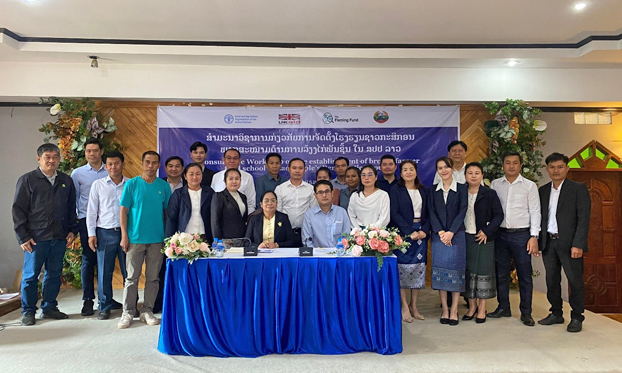 © FAO/Noutlady Inthavong | LAO PEOPLE'S DEMOCRATIC REPUBLIC Extending farm biosecurity and prudent use of antimicrobials through One Health mechanism
The consultation workshop on the establishment of broiler farmer field school (BFFS) in Lao PDR was held from 5 to 6 August in the Vientiane Province. With financial contribution from the United Kingdom Agency for International Development (UKAid) through the Fleming Fund, FAO brought 25 representatives from government agencies and private sector to develop and agree upon the mechanism for the selection of the BFFS sites, while ensuring all activities identified and listed during the workshop is ready for the BFFS set-up in Vientiane capital. The workshop aimed to enhance collaboration between stakeholders, including the government and private sector, in piloting BFFS to improve good practices, farm biosecurity, and antimicrobial use, reduce antimicrobial resistance and increase broiler farmer profits. |
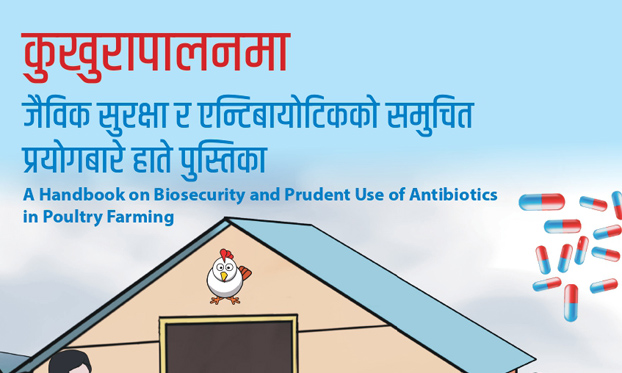 © FAO/Surendra Karki | NEPAL Publication of a handbook on biosecurity measures and rational use of antibiotics in poultry farming
FAO, through USAID funded Global Health Security Program (GHSP) and in collaboration with the Department of Livestock Services published “A Handbook on Biosecurity and Prudent Use of Antibiotics in Poultry Farming” This handbook will serve as useful resource for the small and medium holder poultry farmers in improving biosecurity measures and promote rational use of antibiotics in poultry farms. |
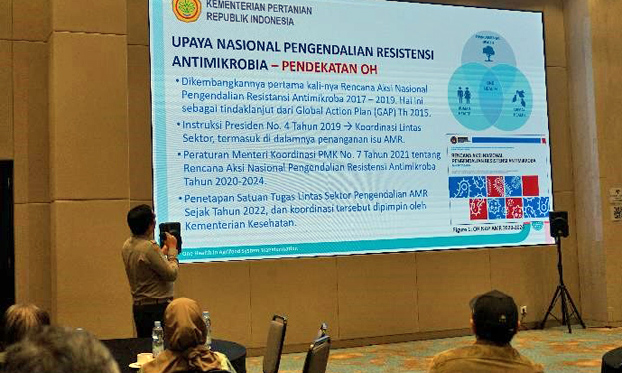 © FAO/Alia Dwirahmani | INDONESIA Poultry sector joins efforts to combat antibiotic resistance
On 19 August 2024, FAO, in collaboration with the Directorate General of Livestock and Animal Health at the Ministry of Agriculture (DGLAHS-MoA) and supported by USAID, held a workshop to discuss the development of AMR control indicators in the veterinary health sector through the prudent and responsible use of antibiotics in poultry farming. This workshop followed a meeting on 15 August that introduced the significance of Private Sector Engagement (PSE) in AMR control and established target indicators for the National Action Plan (NAP) AMR 2025-2029. The workshop provided a platform for the private sector to contribute to the development of regulations and policies, leading to a significant commitment from the private sector to align with the NAP AMR 2025–2029 target indicators. |
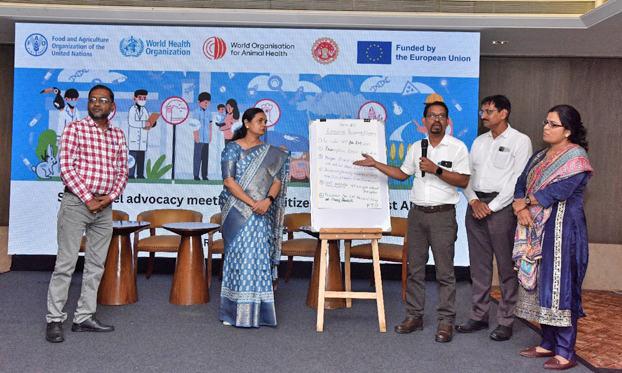 © FAO/Jyoti Misri | INDIA First state-level AMR advocacy meeting organized
FAO, in collaboration with the Government of Madhya Pradesh, organized the first state-level advocacy meeting on AMR in Bhopal on 20 August. Supported by the EU Regional Tripartite AMR Project, the meeting was attended by over 60 experts from across the One Health spectrum, to discuss a top-down approach to prioritize AMR in the animal health sector. This collaborative effort aims to strengthen AMR containment strategies and enhance inter-sectoral communication, setting a precedence for other states in India. The objective of the meeting was to advocate and identify actionable steps under the Madhya Pradesh State Action Plan for Containment of Antimicrobial Resistance (MP SAPCAR). |
Learn more about our work on AMR here.
| |
-training-in-west-kalimantan.jpg?sfvrsn=fbea7d2a_1) © FAO/Ratmoko Saputro | INDONESIA Community ASF biosecurity interventions (CABI) training in West Kalimantan FAO, in partnership with the Ministry of Agriculture (MoA) and supported by the Ministry of Agriculture, Food and Rural Affairs of the Republic of Korea (MAFRA-ROK), conducted training for smallholder pig farmers in Landak and Pontianak Districts, West Kalimantan Province, as part of the Community ASF Biosecurity Interventions (CABI) from August 20 to 22. FAO, MoA, and the Local Livestock Service in Pontianak and Landak districts discussed and agreed to review and update the implementation of the four biosecurity modules for small-scale pig farms. Most pig farmers have already adopted biosecurity practices in four key areas: isolation, cleaning and disinfection, and movement control. |
Learn more about our work on ASF here.
| |
